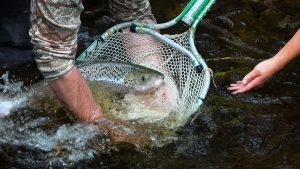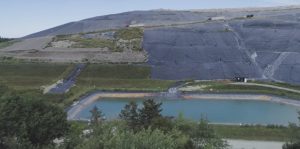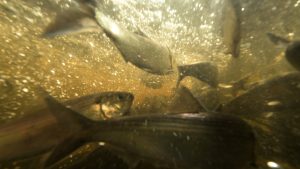Wolfden Resources Corporation Pushes for Mining Development in Katahdin Region at Headwater Tributaries of the Penobscot River

In 2017, the exploratory mining company Wolfden Resources Corporation purchased over 7000 acres of land surrounding Pickett Mountain Pond, within Maine’s so-called Unorganized Territories. These are the headwater tributaries of Panawubskaywiduk (also known as the Penobscot River), the largest watershed in Wabanaki Territory. Now, for the second time since 2020, the company is seeking approval from the Land Use Planning Commission (the LUPC) for the rezoning of 374 acres to allow for the metallic mining of lead, copper, gold, silver, and primarily zinc.
Wolfden withdrew its first rezoning application after the LUPC cited 59 errors and inconsistencies, missed deadlines and insufficient information including details on waste tailing facilities. The company now says these will be located within a yet to be identified town nearby, potentially Patten, Hersey or Stacyville. Therefore, they say, it is out of LUPC jurisdiction and its potential environmental impacts should not be considered in the current rezoning decision.
The Wəlastəkwi (also known as the Houlton Band of Maliseets) and the Pαnawάhpskewi (also known as the Penobscot Nation) are among the intervenors formally opposing Wolfden’s LUPC application. Hearings are being held in Millinocket October 16, 17, and 18 and in Bangor, October 23rd.

Waters surrounding the proposed mine are designated as Critical Atlantic Salmon habitat.
Image credit: Atlantic Salmon Federation
The proposed mine would be in close proximity to numerous critical water bodies, Katahdin Woods and Waters National Monument, Baxter State Park and a number of Tribal Trust Lands. Its operation threatens devastating acid mine drainage pollution that could irreversibly impact water, fish and Wabanaki culture.
The waters that could be directly impacted by the proposed mine are Pickett Mountain Pond, Grass Pond, Mud Pond, Pleasant Lake and the streams connected to them, all in the headwaters of the West Branch of the Mattawamkeag River. The Tribes are also concerned that any pollution from the mine could potentially reach the Penobscot River.
Pleasant Pond, Mud Pond and Grass Pond are all Heritage Brook Trout Ponds. The West Branch of the Mattawamkeag River, the East Branch of the Penobscot River and surrounding areas are designated as “Critical Atlantic Salmon habitat.” Parts of the West Branch of the Mattawamkeag, the East Branch and main stem of the Penobscot River are also designated by the State of Maine for “sustenance fishing” use. The Penobscot Nation maintains treaty reserved sustenance fishing rights in the Penobscot River, which would be threatened by any contamination.
The Penobscot Nation, environmental and conservation groups, and numerous state and federal agencies have made extensive efforts to restore Atlantic salmon and other sea-run fish within the Penobscot River through the Penobscot River Restoration Project and subsequent efforts.
One of the most pervasive and devastating impacts from sulfide mining on ecosystems across the globe is acid mine drainage. When sulfide rock is exposed to air and moisture during the mining process it can create sulphuric acid, which can enter ground and surface water. Most aquatic species are intolerant to acidic water, including Brook Trout and Atlantic Salmon. The acid can also leach heavy metals from the mined rock, such as copper, lead, arsenic and mercury, which also can enter soil, groundwater and surface water. Additionally, high acidity can leach heavy metals from the sediments in water bodies, further endangering aquatic life.
Acid mine drainage is one of the most pervasive and devastating impacts from sulfide mining, as in this photo from the mid-Atlantic US. Image credit: US EPA


Sam St. John with Natural Resources Department of the Wəlastəkwewiyik (Maliseet).
Image credit: Sunlight Media Collective
Regarding any perceived resistance to their efforts to mine in Wabanakik, Wolfden Resources has made statements to its shareholders that demonstrate a lack of acknowledgement or respect for Tribal sovereignty and treaty rights. In 2021, a video circulated showing the CEO of Wolfden stating : “There are no indigenous rights in Maine, so this just streamlines the permitting process.”
Last year, when Wolfden Resources began mining exploration downeast in Pembroke, they were met with strong, organized opposition from area residents including the Passamaquoddy Tribe, citing the fear of acid mine drainage which could contaminate local wells and Cobscook Bay. In May of 2022, residents of Pembroke voted overwhelmingly to pass an ordinance prohibiting industrial metallic mining.
Long after closure, mine sites continue to have ongoing harmful impacts that are extremely expensive and difficult to mitigate. The last two mines to operate within Maine closed in the 1970s, but still continue to leach highly acidic water and toxic heavy metals into private wells and public fisheries costing taxpayers millions of dollars in treatment and remediation.

Opponents to mining will rally outside prior to the public hearings on October 16 in Millinocket and October 23 in Bangor, both at 5:15 pm. Image credit: Sunlight Media Collective
Beginning in 1991 and for more than thirty years following, Maine had the strictest metallic mineral mining laws in the nation. High water quality standards were ensured for all development as part of a consolidated permitting process, a function of environmental principles guiding legislation at that time. In 2012, fundamental changes were advanced when mining industry representatives went to work to weaken these standards, through the elimination of the consolidated permitting process, effectively divorcing the application for metallic mineral mining permits from the pre-existing standards in place for environmental protection. In 2017 when the laws changed again, the consolidation permit process was not restored, therefore exempting metallic mining from its strictest standard of environmental protection.
The Land Use Planning Commission will hold a series of public hearings on Wolfden’s rezoning request.
On October 16th through the 18th, day-long hearings with intervenors will be held in Millinocket at Stearns High School, with public comment sessions in the evenings of the 16th and 17th at 6:30pm. A public hearing will be held October 23rd at 6:30pm in Bangor at the Cross Insurance Center.The Bangor hearing was added after 54 legislators petitioned the LUPC to hold a public hearing in a more central location to increase accessibility for those wishing to speak on their concerns about the impacts of metallic mining.
Opponents to mining will rally outside prior to the public hearings on October 16th in Millinocket at 5:15pm and on October 23rd in Bangor at 5:15pm.
The Maine Land Use Planning Commission (LUPC) will livestream all sessions of the Public Hearing. The livestream will be available on YouTube and may be accessed through this link starting October 16: LUPC ZP779A Pickett Mountain Mine Livestream.
The link to the livestream is also available on the LUPC’s Homepage, the LUPC’s Pickett Mountain Mine project webpage, and the LUPC’s Calendar page. An agenda for the hearings is as follows.
Technical Sessions of the public hearing will take place from:
- 9:30 a.m. to 4:30 p.m. on Monday, October 16,
- 8:30 a.m. to 4:30 p.m. on Tuesday, October 17, and
- 8:30 a.m. to 12:05 p.m. on Wednesday, October 18, 2023.
For a detailed schedule of the Technical Sessions, consult the Fourth Procedural Order for the Hearing, posted on the LUPC’s project-specific webpage. Technical Sessions will take place in the gymnasium of Stearns Jr./Sr. High School, 199 State St., Millinocket, ME.
Public Comment Sessions of the hearing will take place:
- 6:30 p.m. on Monday, October 16; at the gymnasium of Stearns Jr./Sr. High School, 199 State St., Millinocket, ME
- 6:30 p.m. on Tuesday, October 17; at the gymnasium of Stearns Jr./Sr. High School, 199 State St., Millinocket, ME
6:30 p.m. on Monday, October 23, 2023, at the Cross Insurance Center, 515 Main St., Bangor, ME
Public comments on this application are welcome until the close of the record after the hearing. The LUPC encourages interested persons to submit written comments by email to [email protected]. Written comments submitted on paper should be sent to the Maine Land Use Planning Commission, Attention: Tim Carr, 22 State House Station, 18 Elkins Lane, Augusta, ME 04333-0022.






